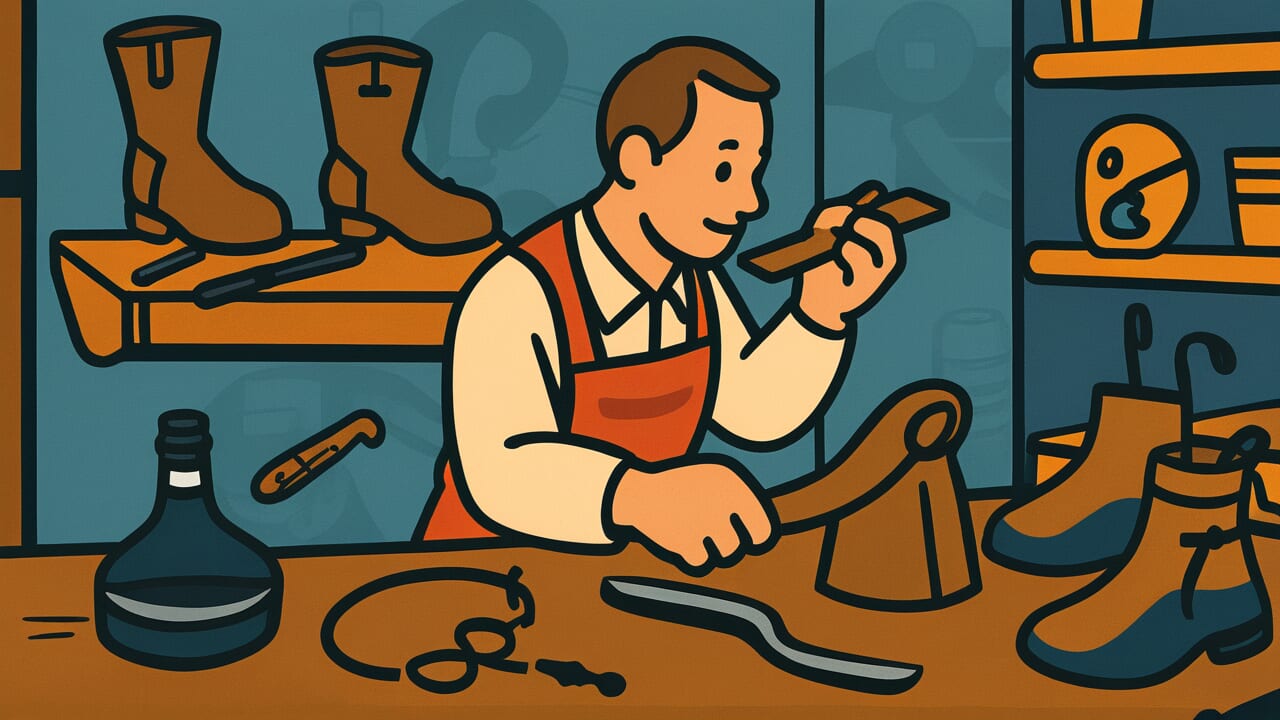How to Read “Let not the cobbler go beyond his last”
Let not the cobbler go beyond his last
[LET not the COB-ler go bee-YOND his last]
A “last” is the foot-shaped tool cobblers use to make shoes.
Meaning of “Let not the cobbler go beyond his last”
Simply put, this proverb means people should stick to what they know best and not try to be experts in everything.
The literal words talk about a cobbler, someone who makes and repairs shoes. A “last” is the wooden foot-shaped tool they use to shape leather. The saying warns the cobbler not to go beyond this tool. In deeper terms, it means everyone should recognize their limits and stay within their area of skill.
We use this wisdom today when people try to give advice outside their expertise. A great cook might not know how to fix cars. A talented athlete might struggle with business decisions. The proverb reminds us that being good at one thing doesn’t make us good at everything.
What’s interesting about this wisdom is how it protects both the person and others around them. When someone stays in their lane, they avoid embarrassing mistakes. They also avoid giving bad advice that could hurt others. The proverb suggests that knowing your limits is actually a sign of wisdom, not weakness.
Origin and Etymology
The exact origin is unknown, but this proverb comes from ancient times when craftsmen were highly specialized. It appears in various forms across European languages. The earliest recorded versions date back to classical antiquity, though the specific wording has changed over centuries.
During ancient and medieval times, craftsmen spent years learning their trade. A cobbler would apprentice for years just to master shoe-making. Society depended on this specialization because each craft required deep knowledge. People understood that crossing into another person’s expertise could be dangerous or wasteful.
The saying spread through trade routes and cultural exchange. Different languages developed their own versions with local craftsmen as examples. Over time, the message expanded beyond literal crafts to include any area of knowledge or skill. Today we use it for everything from professional advice to hobby discussions.
Interesting Facts
The word “cobbler” comes from Middle English, meaning someone who patches or mends roughly. Originally, cobblers were considered lower-skilled than cordwainers, who made new shoes from scratch. A “last” gets its name from an Old English word meaning “to follow” or “footstep,” since it follows the shape of a human foot.
Usage Examples
- Manager to employee: “You’re giving marketing advice when you’re hired for accounting – Let not the cobbler go beyond his last.”
- Coach to player: “Focus on your defense instead of critiquing the referee’s calls – Let not the cobbler go beyond his last.”
Universal Wisdom
This proverb reveals a fundamental tension in human nature between confidence and competence. Humans naturally develop expertise through focused practice, but we also have a tendency to overestimate our abilities in unfamiliar areas. This cognitive bias exists because confidence often helped our ancestors survive, even when it exceeded their actual skills.
The wisdom addresses a deeper truth about how knowledge actually works. Real expertise requires not just learning facts, but developing judgment through experience. A cobbler doesn’t just know about leather and tools. They understand how different materials behave, how feet move in shoes, and what problems arise over time. This kind of deep knowledge can’t be quickly transferred to other fields, even though it might seem simple from the outside.
The proverb also reflects the social nature of human communities. When everyone tries to do everything, the community suffers. Specialization allows groups to accomplish far more than individuals working alone. But specialization only works when people respect boundaries and trust each other’s expertise. The saying reminds us that admitting our limits isn’t just personal wisdom. It’s what allows human societies to function effectively and build complex achievements over time.
When AI Hears This
When people step outside their expertise, they create invisible costs everywhere. Society works like a giant trust system built on specialization. Each person staying in their lane keeps this system running smoothly. But when boundaries blur, everyone must double-check work they shouldn’t need to verify.
Humans rarely notice they’re part of this knowledge economy. Breaking expertise rules forces others to become instant experts in unfamiliar areas. This wastes enormous energy across society. The cobbler who gives medical advice doesn’t just risk being wrong. He makes patients question real doctors too.
What fascinates me is how this creates a beautiful hidden cooperation. Humans naturally want to share opinions about everything they encounter. Yet societies thrive when people resist this urge in serious matters. The restraint itself becomes a gift to everyone else. Staying quiet outside your expertise is actually generous teamwork.
Lessons for Today
Living with this wisdom means developing honest self-awareness about our strengths and limitations. This doesn’t mean avoiding all new learning or staying rigidly in one box forever. Instead, it means recognizing the difference between casual knowledge and deep expertise. When we venture into new areas, we can approach them with appropriate humility and respect for those who have invested years in mastering them.
In relationships and collaboration, this wisdom helps create better teamwork. When people acknowledge their limits, they naturally seek out others with complementary skills. This creates opportunities for mutual respect and learning. It also prevents the frustration that comes when someone insists on controlling areas where they lack experience. Groups work better when members can honestly say “that’s not my strength” and trust others to fill those gaps.
At larger scales, this principle helps communities and organizations function more effectively. It encourages the development of genuine expertise rather than shallow generalization. It also creates space for different people to contribute their unique strengths. The wisdom doesn’t demand that we never learn new things, but rather that we approach unfamiliar territory with appropriate respect and patience. Understanding our limits often becomes the foundation for genuine growth and meaningful contribution.



Comments